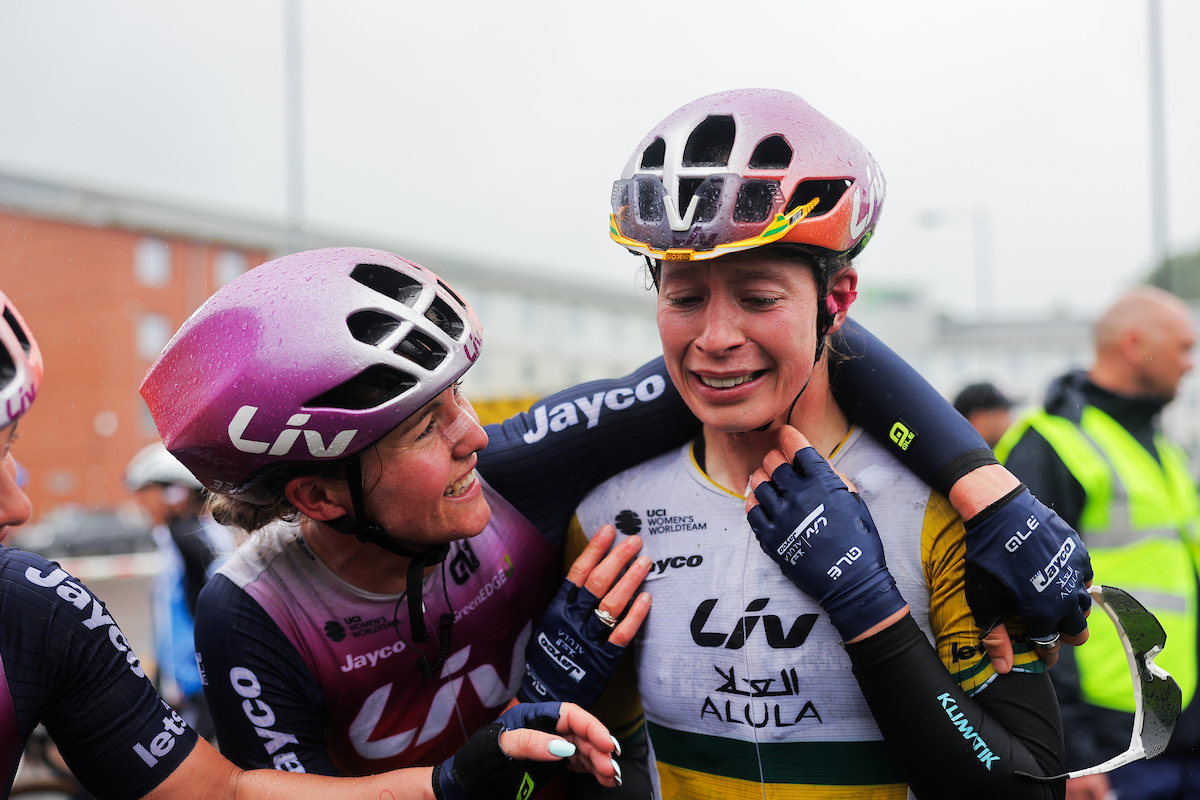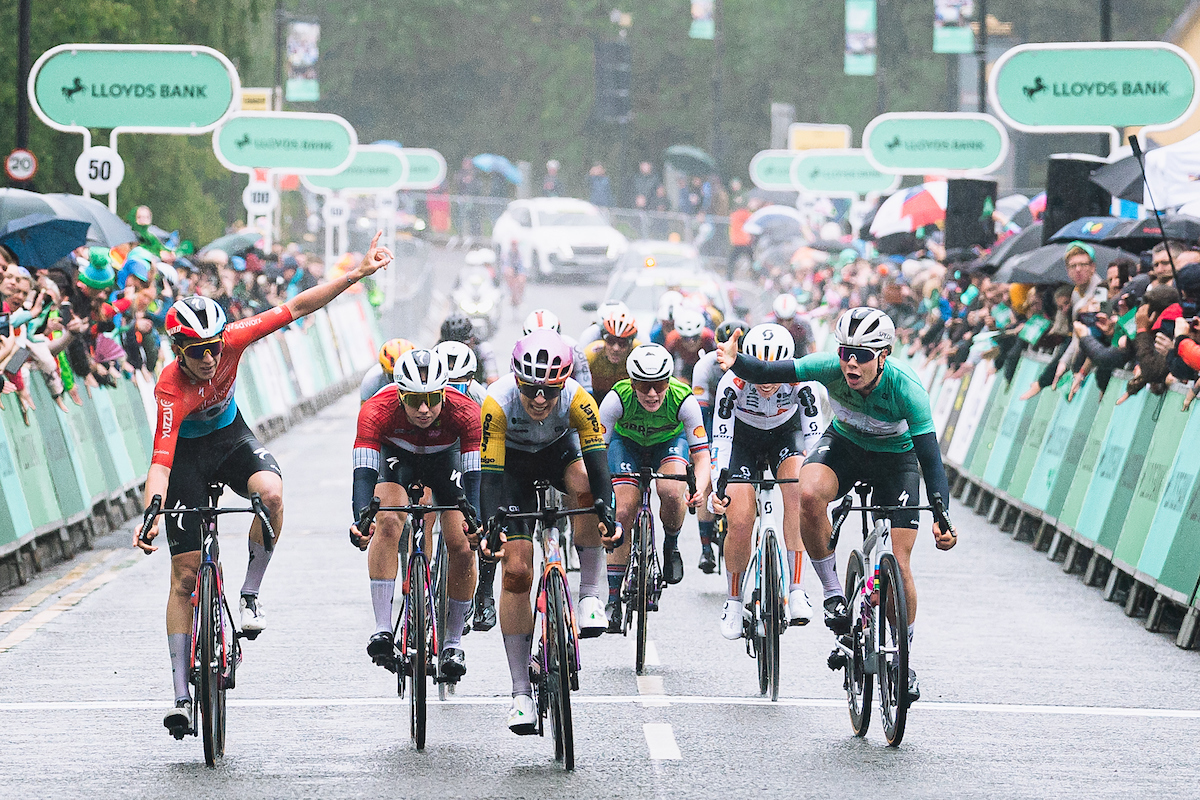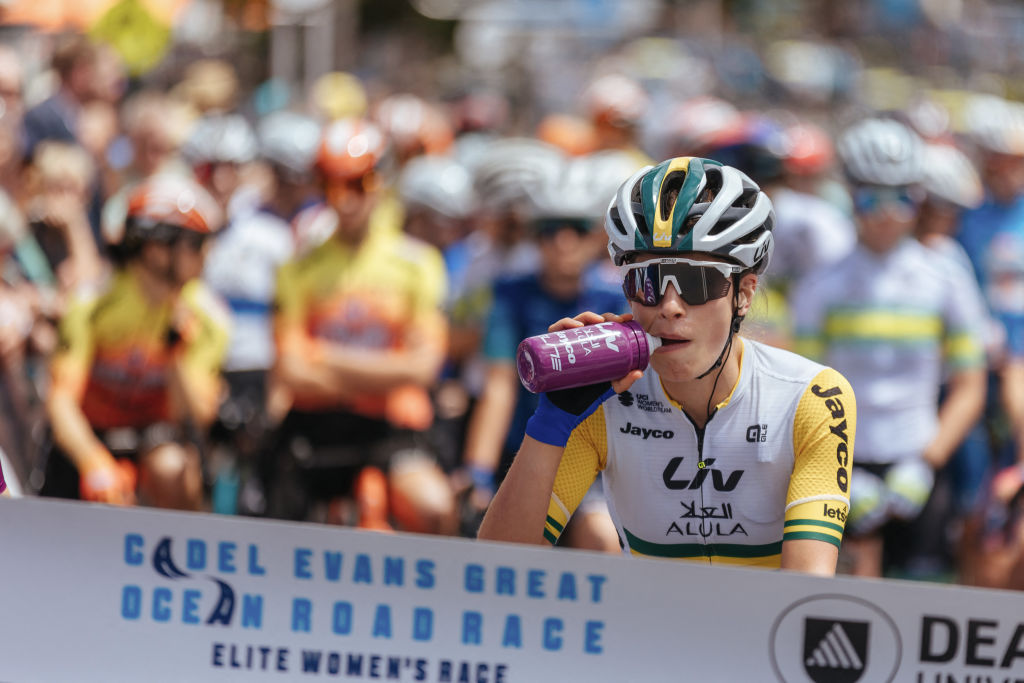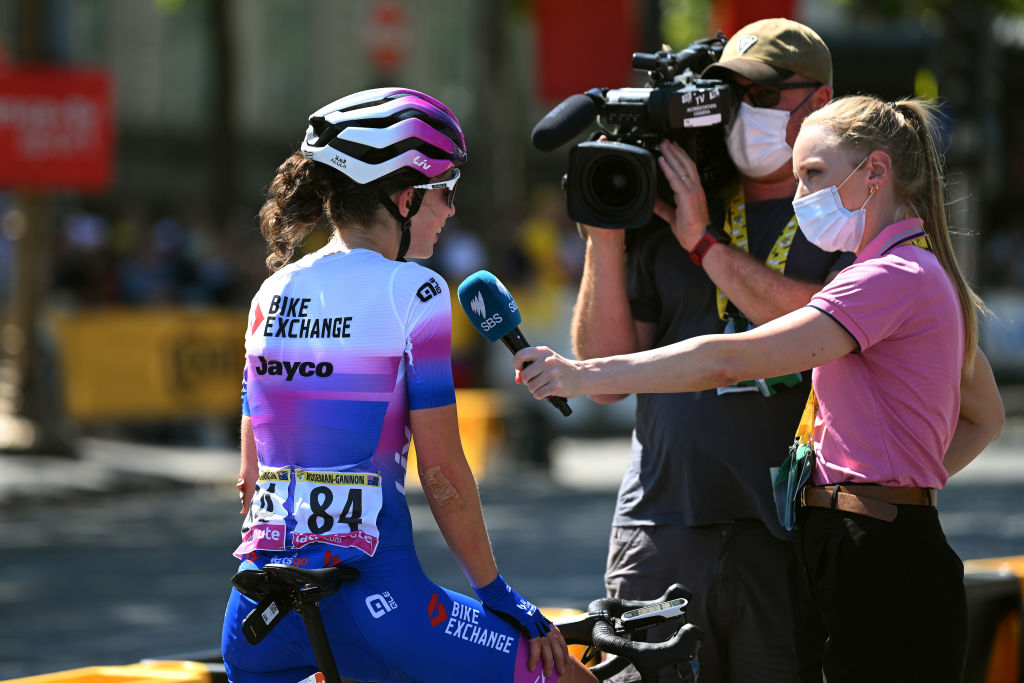
Australia's top-ranked Women's WorldTour cyclist, Grace Brown, may be retiring at the end of the season but there are no shortage of compatriots vying to take over that leading role. A new generation of riders, such as Ruby Roseman-Gannon, are on the rise and finding success in the top ranks of professional cycling.
The double national champion's performance trajectory recently peaked with her first WorldTour victory at the Tour of Britain, and Roseman-Gannon is now focussed on ramping her form up a notch and making her nation and Liv AlUla Jayco team proud at the Giro d'Italia Women and Tour de France Femmes.
"I'm not physically at my best yet, based on my sensations and numbers, but I'm at a good level. Now, I have the opportunity to build on that for the summer with big races coming up, such as the Giro and then the Tour. I'm motivated for those," Roseman-Gannon told Cyclingnews just days after she triumphed over a trio SD-Worx riders, including world champion Lotte Kopecky, in the final stage at the Tour of Britain.
The 25-year-old has only recently begun her professional racing career, having joined Liv AlUla Jayco (then Team Bike Exchange-Jayco) in 2022. She's had a steep learning curve since leaving her home community and the comparatively small fields of the National Racing Series (NRS) to compete on the WorldTour for the last two seasons.
She's made the most of her time overseas, earning a podium in her first race with the team at the Setmana Valenciana and then competing in the rebirth of the women's Tour de France in 2022. She has also consistently placed in the top 10 at important races, including the Simac Ladies Tour, Thüringen Ladies Tour, Tour de Romandie, Giro d'Italia, Tour de France, and the one-day race GP de Plouay.
Although the rider from Melbourne's Brunswick Cycling Club made the transition to pro bike racing at the top level appear almost effortless, she said it can, at times, be much harder for Australians to adapt than those who have grown up racing on European soil.
"It's a big step up. Anyone who comes from Australia faces a challenge to step up the European field, in terms of the skills, physically and tactically, everything is so different. We don't have the depth or size of field in Australia. It can be hard to come over here before you turn professional because it is so expensive," Roseman-Gannon said.
A return flights alone costs around $3000 in local currency and that's even before the extra expenses that come with living so far from home, from accommodation to insurance.
"My first year was definitely ... it felt like I was thrown in the deep end, but I podiumed in one of my first races - Valencia - and before that, I didn't know if I would be getting dropping, struggling to hold on, be in the finals or where I would fit in. That podium gave me confidence. I felt like I was kind of at the right level.
"I've tried to improve and be my best in every facet of what it takes to be professional. Sometimes it feels like I'm not progressing, but if I focus on trying to improve, then eventually it works out."
Some riders and teams initially start in the lower-level events for a more gradual approach to European racing in the first year or two. However, Roseman-Gannon felt that while those events could provide opportunities to learn and build confidence, joining the top-tier team was the quickest way for her to adapt to the demands of the highest level of the sport.
"It's been good for me. Our team hasn't traditionally done smaller races in the years I've been on it, maybe a few, but not many. It's been good to race the bigger race, getting to know the WorldTour peloton, how it functions, the riders, and tactics," she said.
"At the same time, riding in smaller races can be good for practicing finals, how to win, and the lead-out train, all with less pressure and physical demands. There is less depth in the smaller races, so you can practice giving a really good lead-out, for example. We are developing this now, personally, I find it difficult knowing what my teammates need, what I might do, when is it too early or too late."

Double summers
Roseman-Gannon started this season with a bang, winning two national titles in the criterium and the road race at the Australian Road Championships in January.
But she said that juggling the demands of racing across both the southern and northern hemisphere summer seasons can be hard for many athletes. She understood that joining a team like Liv AlUla Jayco meant finding a way to manage better the training and racing loads spread across nearly 12 months of the year.
"It depends on personal ambitions and the team's goals. Our team is Australian, and Jayco is an Australian sponsor, so it's important for us to be going well in the Australian summer. There is an expectation that we will come in top form. If you come from another team, there might not be those expectations. I'm motivated by the Australian summer of cycling. It was the last season for [Nationals] in Buninyong, which is close to where I live, so it was important for me," she said of the 2024 Australian season.
"You can't be at your top form all year; there has to be a give and take. Sometimes, the more you race, it can be good, and sometimes, you need a training block to get to the next level. We managed OK this year, but it's hard to know because I was building up to my peak when I crashed at [Nokere Koerse]. I had a forced break, which could be good for the rest of the season because it was a proper break."
Roseman-Gannon was forced to take two weeks off the bike due to a muscle tear and bone bruising between the patella and femur sustained in that crash at the Nokere Koerse in May. She didn't return to racing until nearly two months later at the Vuelta a Burgos and then the Tour of Britain, taking her first victory in the national champion's jersey.
"I definitely want to represent this jersey well. It's something I dreamed about achieving for a long time. It's not something I think about in a race. I'm just thinking about bike racing and don't feel differently. No matter what level of bike race, I get into a mindset where I am so focussed on doing my best with the job I have or going for the win. I think when Australians recognise you so easily, call out to you, especially in Australia at Tour Down Under. It is nice to have support from home."

Giro d'Italia and Tour de France
Roseman-Gannon will next race at the Giro d'Italia Women from July 7-14, followed by the Tour de France Femmes from August 12-18, directly after the Olympic Games.
She said that one thing she learned from her victory at the Tour of Britain was that the dominant team, SD Worx-Protime, even with the powerful duo of Lorena Wiebes and Lotte Kopecky, was beatable.
Roseman-Gannon had praised the team and their two star riders, but said Liv AlUla Jayco's relentless attitude during each stage was the key to their success against the Dutch squad.
"SD Worx is a tough team to beat. They have talented, strong, smart, skillful riders. When you have Lorena Wiebes and Lotte Kopecky, it's a difficult duo to beat. But I feel like this year, compared to last, there has been a turning point where teams are challenging SD Worx, tactically, and the strength of riders, too," she said.
"We came into the stages with the attitude that we were going to try and win, and we weren't intimidated by such a strong team. We were not defensive, and while we let them dictate the race, we also wanted to dictate the race ourselves.
"It was luck, and the whole team had put in so much all week, and we tried to do something special. It was cool to finish it off like that."
There are two stages that Roseman-Gannon is eyeing at the Giro d'Italia Women: stage 2 into Volta Mantovana and stage 5 into Foligno, where she hopes to improve on her top-10 performance last year.
"Our team will be mostly climbers so that I will have more of a sprinter's role. There are two sprint stages, two intermediate stages and a time trial, which looks crazy because it has a cobbled descent with tight hairpins. The two sprint stages could suit me, and maybe some of the others, depending on how early GC is set and how it is raced."
Roseman-Gannon acknowledged that the opening three stages of the Tour de France Femmes will cater to the sprinters in the Netherlands, notably home favourite Wiebes. She admitted that even though she doesn't view herself as a pure sprinter, she believes she can find success there if she races to her strengths.
"I'm not one of the best sprinters in the world. I wouldn't put myself as a pure sprinter. I'm more in the middle. I'm not Charlotte Kool or Lorena Wiebes, or even Georgia Baker. What I do have is the ability to position myself well. I can put myself in a position to give it everything I have. At Tour of Britain, it worked out well," she said.
"There is pressure, but in the Netherlands, there is also wind and corners, and in that way, those conditions, though scary, suit me more than a traditional sprint day with a straight run-in.
"I don't feel much pressure. I will prepare as best I can and give everything I have to the team. I get personal satisfaction from preparing and then executing as best I can, and there is nothing more I can do. Lorena Wiebes is Lorena Wiebes, and she is a difficult rider to beat.
"Every stage is raced like a one-day race, and when you only have eight stages to win and 20 top riders who all want to win, teams are going in for all of them."
All athletes face the increased level of media attention that goes along with the Tour de France, and Roseman-Gannon has experienced being under the watchful eye of the press and almost daily press obligations from her first tilt at the event in 2022. It is something she is better prepared for this time around.
"The Tour was insane in 2022. The media was nothing like I had ever experienced before. The amount of press over everything we did in the race, it was critiqued, watched, commented on, which was amazing for our sport, and the fans at the side of the road were crazy," she said.
"It's a different experience as a rider; if something goes wrong, you make a mistake or have a bad day, there isn't the same sort of concentration. Even friends back in Australia were watching and sending text messages [with the Tour de France Femmes]. It was exciting that so many people were watching, but also intimidating. You want to do your best but you also have that external pressure to handle."

Stability, support and the future
Although the Tour de France Femmes start list has yet to be confirmed, Roseman-Gannon noted the increased number of Australian riders competing in Europe and the generation of athletes who have made it to this level of racing through new avenues of support.
She specifically noted Neve Bradbury (Canyon-SRAM), Josie Talbot (Cofidis), and several Continental teams that have made their way overseas to compete in top-tier racing. Grace Brown recently announced her plan to retire at the end of this season but Roseman-Gannon believes that the number of Australians on the start line at the biggest races will continue to grow.
"We have a lot of depth now, which is exciting. We've always had a WorldTour contingent, but now we have Neve Bradbury through the Zwift Academy and Sarah Gigante," with Roseman-Gannon pointing out that the AG Insurance-Soudal rider and fellow Brunswick Cycling Club member won nationals in her first year out of the junior ranks.
"We have had riders go straight from NRS to Mitchelton; Lucy Kennedy, Grace Brown, and myself won the NRS and went straight to Mitchelton or Bike Exchange. That was the only pathway that I could see when I first started," she said.
"Now, we've had Josie Talbot at Cofidis, and Continental teams Bridgelane and ARA-Skip Capital racing Tour de Suisse. There are so many more opportunities now, financially and [with] the support, I expect to see more Australians at a higher level.
"It is a challenge to get here," said Roseman-Gannon. "To be honest, I never thought I would be a professional road cyclist. There wasn't that much money in the sport and the idea of being financially unstable in a country that is a 24-hour flight away from home ...
"I didn't feel like I had the financial security to do that, and at the risk of serious health and insurance, it didn't seem feasible when I was growing up. Now it is because we have that support and new pathways. I feel privileged to be coming through at this time of the sport."







